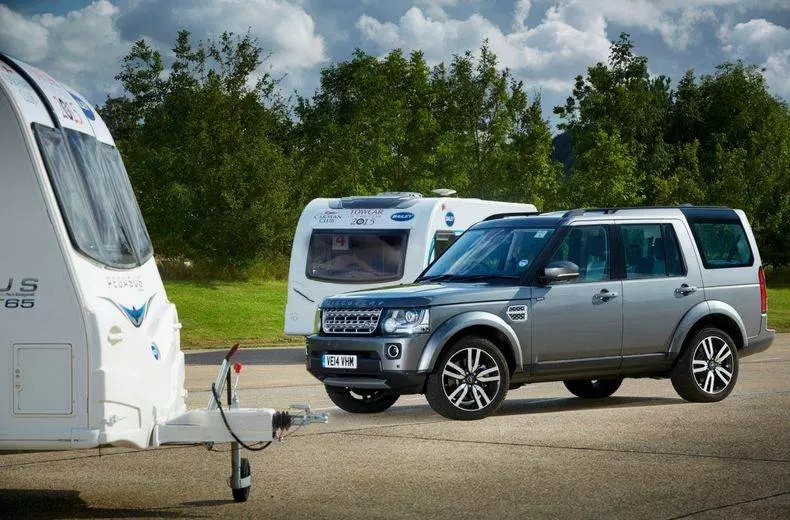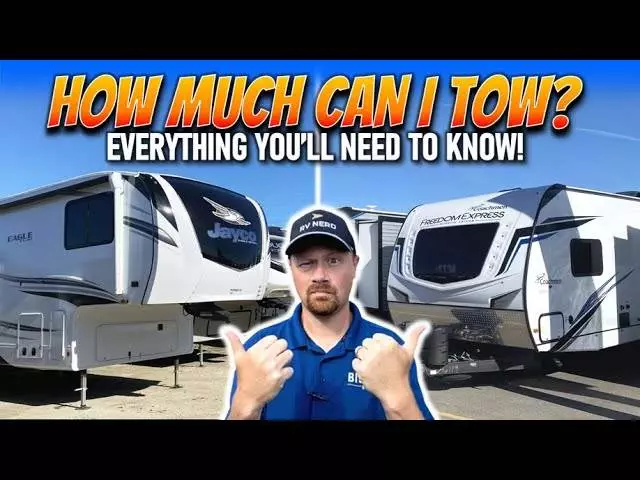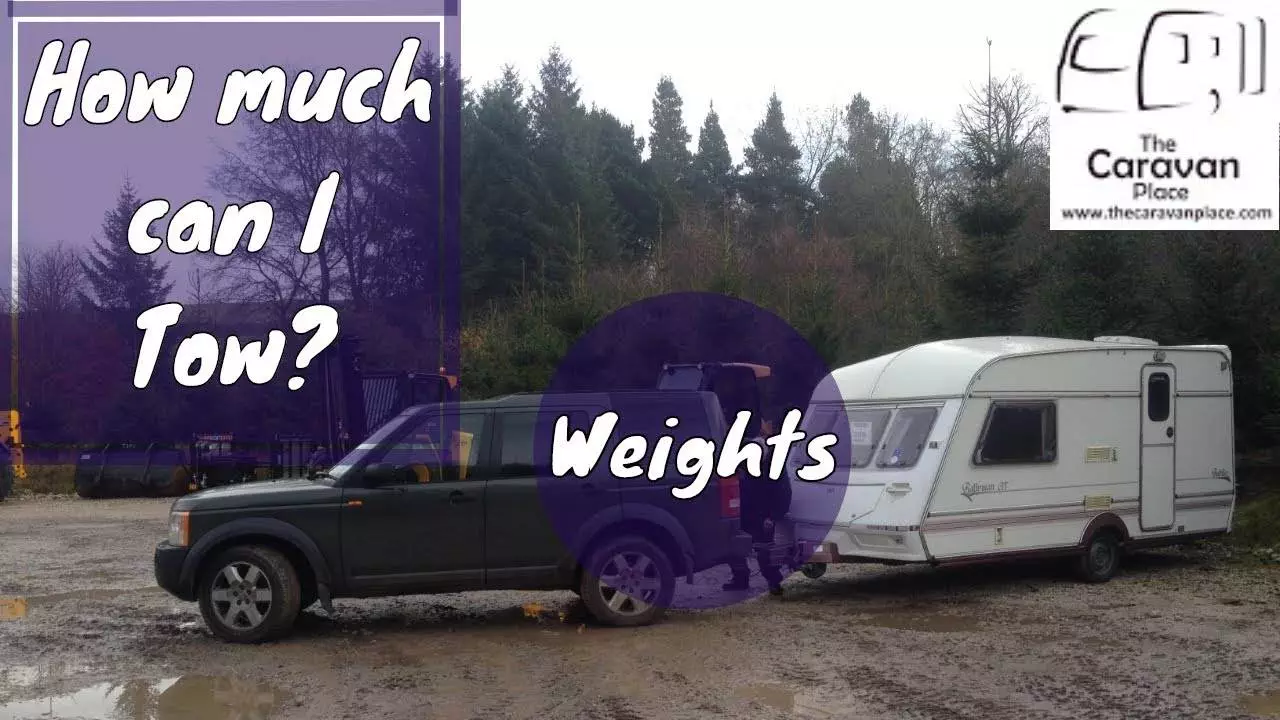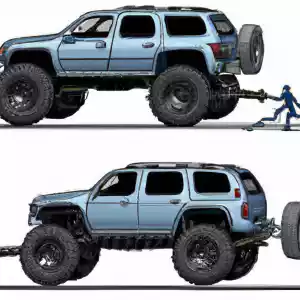Ladies and gentlemen, have you ever found yourself contemplating the weight limits of your vehicle while towing? Well, today we embark on an enlightening journey to unravel the mystifying question: “How much should you actually tow?” As avid adventurers ourselves, we understand the importance of striking a perfect balance between load and performance. Join us as we delve into the world of towing capacities and unravel the key factors that determine the ideal weight to tow for your vehicle. Stay tuned for insightful tips and helpful guidelines that will leave you towing with confidence and peace of mind on your next expedition.

This image is property of d1gymyavdvyjgt.cloudfront.net.
Determining Your Vehicle’s Towing Capacity
Understanding Your Vehicle’s Manufacturer Ratings
When it comes to determining the towing capacity of your vehicle, understanding the manufacturer ratings is crucial. These ratings are provided by the vehicle manufacturer and give you an idea of how much weight your vehicle can safely tow. The two main manufacturer ratings to consider are the gross vehicle weight rating (GVWR) and the gross combination weight rating (GCWR).
The GVWR is the maximum weight limit that your vehicle can safely carry, including passengers, cargo, and the tongue weight of the trailer. It is important to note that this rating includes the weight of the vehicle itself. The GCWR, on the other hand, is the maximum weight limit of your fully loaded vehicle and trailer combined.
Checking Your Vehicle’s Owner’s Manual
To determine your vehicle’s specific towing capacity, one of the first steps you should take is to refer to your vehicle’s owner’s manual. The owner’s manual provides valuable information about your vehicle’s towing capabilities and any specific guidelines or recommendations from the manufacturer. It will typically include a towing capacity chart that specifies the maximum weight limits based on the vehicle’s configuration and equipment.
Consulting the Vehicle Manufacturer
If you still have questions or need further clarification about your vehicle’s towing capacity after consulting the owner’s manual, it is recommended to reach out to the vehicle manufacturer directly. They have access to detailed specifications and can provide accurate information based on your vehicle’s specific make, model, and year. The manufacturer’s customer service or technical support department can guide you in understanding your vehicle’s towing capabilities and any additional considerations.
Considering the Vehicle’s Engine and Transmission
In addition to the manufacturer ratings, it is important to consider the capabilities of your vehicle’s engine and transmission. A more powerful engine typically allows for higher towing capacities, while a weaker engine may limit the amount of weight your vehicle can safely tow. Similarly, vehicles with a manual transmission may have different towing capacities compared to those with an automatic transmission.
Before towing, you should assess the towing limits recommended by the vehicle manufacturer for your specific engine and transmission combination. This information can usually be found in the owner’s manual or by contacting the manufacturer directly.
Assessing the Vehicle’s Suspension and Braking Systems
When towing a trailer, it is essential to consider the impact on your vehicle’s suspension and braking systems. The added weight can strain the suspension, affecting the vehicle’s stability and handling. Upgrading the suspension, such as installing heavier duty springs or stabilizer bars, may be necessary to ensure safe towing.
Additionally, the increased weight of the trailer requires a more robust braking system to effectively stop the combined weight of the vehicle and trailer. Consider upgrading to a larger brake package or installing a trailer brake controller to ensure adequate braking power.
Considering the Weight of Your Trailer
Calculating the Gross Trailer Weight
To determine the weight of your trailer, you need to calculate the gross trailer weight (GTW). The GTW is the total weight of the loaded trailer, including all cargo, fluids, and accessories. To obtain an accurate measurement, it is recommended to take the trailer to a certified weigh station.
When calculating the GTW, keep in mind that it should not exceed the towing capacity of your vehicle. It is crucial to account for all the items you plan to carry in the trailer, as well as any additional equipment or modifications that may add weight.
Determining the Tongue Weight
The tongue weight refers to the downward force exerted on the hitch ball by the trailer coupler. It is important to ensure that the tongue weight is within the recommended range specified by the vehicle and trailer manufacturers. In general, the tongue weight should be around 10-15% of the total trailer weight.
An improper tongue weight can greatly affect the stability and handling of the vehicle and trailer combination. Too much weight on the tongue can cause the front of the vehicle to lift, reducing steering control, while too little weight can cause the trailer to sway uncontrollably.
Understanding Trailer Weight Distribution
Proper weight distribution is essential for safe towing. An improperly loaded trailer can cause instability, sway, and potential loss of control while on the road. To distribute the weight evenly, ensure that the heavier items are placed towards the center and lower parts of the trailer.
Consider using weight distribution systems or sway control devices to help evenly distribute the weight and improve stability. These systems are designed to redistribute the load and minimize trailer sway, enhancing the overall towing experience.

This image is property of i.ytimg.com.
Examining Legal and Safety Limitations
Understanding Vehicle Towing Laws
Before hitting the road with a trailer, it is important to understand the towing laws and regulations in your area. Each jurisdiction may have specific requirements regarding trailer size, weight, and safety equipment. Familiarize yourself with the maximum allowable dimensions, weight limits, and any additional requirements, such as trailer brakes, safety chains, or reflective markings.
Failure to comply with towing laws can result in fines, penalties, and even having your vehicle and trailer impounded. To ensure a legal and safe towing experience, always abide by the local towing laws.
Checking Towing Regulations in Your Area
In addition to the broader vehicle towing laws, it is also essential to check for any specific towing regulations in your area. Some neighborhoods, cities, or states may have additional restrictions or limitations on towing trailers. These may include restrictions on certain roads, parking limitations, or noise restrictions.
By researching and understanding these regulations beforehand, you can avoid any unnecessary complications or violations while towing.
Considering Safety Factors
Safety should always be a top priority when towing a trailer. The added weight and length of the trailer can significantly impact the vehicle’s handling, stopping distance, and maneuverability. It is essential to consider these safety factors and make necessary adjustments to ensure a safe towing experience.
Allow for increased stopping distances and adjust your driving habits accordingly. Take wider turns, maintain a safe speed, and be cautious of any potential trailer sway. Regularly inspect the trailer and vehicle for any signs of wear or damage that may affect their safety and performance.
Accounting for Additional Load Capacities
Understanding Payload Capacity
In addition to towing capacity, it is crucial to consider your vehicle’s payload capacity when loading a trailer. The payload capacity refers to the maximum weight that your vehicle can carry, including passengers, cargo, and any additional accessories.
To calculate the available payload capacity, subtract the total weight of the vehicle (including fuel and occupants) from the vehicle’s gross vehicle weight rating (GVWR). It is important to ensure that the combined weight of the trailer tongue weight, passengers, and cargo does not exceed the available payload capacity.
Considering Passenger and Cargo Weight
When towing a trailer, it is essential to consider the weight of passengers and cargo inside the vehicle. This additional weight can impact the vehicle’s overall handling, braking distances, and fuel efficiency. Make sure to account for the weight of all passengers and any additional cargo inside the vehicle when calculating the total weight being towed.
It is recommended to distribute the weight evenly inside the vehicle, with heavier items placed towards the center and lower parts to maintain stability.
Factoring in Additional Accessories and Modifications
Any additional accessories or modifications added to your vehicle can affect its towing capacity. These may include roof racks, bull bars, or aftermarket hitches. It is important to consult your vehicle’s manufacturer or a certified professional to determine how these additions may impact the towing capabilities.
Some modifications, such as suspension upgrades or towing-specific accessories, may actually enhance your vehicle’s towing performance. However, it is crucial to ensure that these modifications align with your vehicle’s specifications and have been properly installed by a qualified technician.

This image is property of fifthwheelst.com.
Considering the Towing Environment and Conditions
Evaluating the Terrain and Road Conditions
Before towing, carefully evaluate the terrain and road conditions you will be encountering. Steep inclines, rough terrain, or slippery surfaces can significantly affect your vehicle’s towing capabilities and performance. These conditions may require a more capable vehicle or additional precautions to ensure safe and efficient towing.
If you anticipate towing in challenging environments, consider vehicles with features such as all-wheel drive or four-wheel drive for improved traction and stability.
Assessing the Weather and Climate Factors
Weather and climate also play a significant role in towing safety and performance. High winds, heavy rain, or extreme temperatures can impact the vehicle’s handling and potentially increase the risk of accidents. It is essential to be aware of the weather forecast and plan your towing trips accordingly.
Take into account any additional precautions that may be necessary, such as reducing speed during inclement weather or using sway control devices to minimize the effects of wind gusts.
Considering Altitude and Elevation Effects
Altitude and elevation can affect your vehicle’s performance, especially if you are towing in mountainous regions. As you climb to higher elevations, the reduced oxygen levels can impact the engine’s power output and overall performance. This can make towing more challenging, particularly if your vehicle has a smaller engine or is already operating near its maximum towing capacity.
Be mindful of this factor when planning your route and ensure your vehicle is equipped to handle the additional strain of towing at higher altitudes. Proper maintenance and regular inspections are key to avoiding potential issues in these situations.
Understanding Towing Equipment and Hitches
Choosing the Right Towing Hitch
Selecting the right towing hitch for your vehicle and trailer is crucial for safe towing. There are various types of hitches available, including ball mounts, gooseneck hitches, and fifth-wheel hitches. Each type has its own advantages and considerations, so it is important to choose the one that best suits your towing needs.
Consider factors such as the weight capacity, class rating, and compatibility with your vehicle and trailer combination. Ensure that the hitch installation is done correctly and securely, following the manufacturer’s guidelines.
Installing Weight Distribution Hitches
Weight distribution hitches are important for properly distributing the weight between the towing vehicle and the trailer. They help improve stability, handling, and braking by evenly distributing the load. When towing a heavy trailer, especially those with a higher tongue weight, a weight distribution hitch can greatly enhance the towing experience.
Proper installation and adjustment of the weight distribution hitch are crucial for effective weight distribution. It is recommended to follow the manufacturer’s instructions or consult a qualified technician to ensure correct installation and setup.
Selecting the Proper Trailer Brake Controller
A trailer brake controller is an essential component when towing a trailer equipped with its own braking system. It allows the driver to control and apply the trailer brakes independently from the vehicle’s brakes. This improves the braking performance and helps maintain stability while on the road.
When selecting a trailer brake controller, consider the type of braking system on your trailer (electric or hydraulic) and choose a controller that is compatible with your vehicle. Follow the manufacturer’s instructions for installation and setup to ensure proper functionality.
Using Safety Chains and Trailer Mirrors
Safety chains are an important safety feature that provide an additional layer of security in the event of a trailer detachment from the hitch. They act as a backup connection between the towing vehicle and the trailer. Always ensure that the chains are properly attached, crossed under the trailer tongue, and have adequate slack for turns.
Trailer mirrors are essential for improved visibility while towing. They extend the field of vision, allowing you to see alongside and behind the trailer. Ensure that the mirrors are properly adjusted to provide the best possible view of the road and any surrounding vehicles.

This image is property of i.ytimg.com.
Reviewing Towing Techniques and Best Practices
Maintaining a Safe Speed and Distance
When towing a trailer, it is important to maintain a safe speed that is appropriate for the weight and size of your vehicle and trailer combination. Higher speeds can increase the risk of accidents and reduce your ability to react to unexpected situations.
Additionally, it is crucial to maintain a safe distance between your vehicle and other vehicles on the road. A longer stopping distance is required when towing, so leave ample space to safely brake and avoid rear-end collisions.
Properly Loading and Distributing Weight
Properly loading and distributing the weight in your trailer is essential for safe towing. Ensure that the weight is evenly distributed and secure within the trailer. Avoid placing too much weight towards the rear or front of the trailer, as this can affect the balance and stability.
If necessary, use tie-downs or other securing methods to prevent shifting or movement of the cargo while in transit. Regularly check the load during stops to ensure it remains secure.
Understanding Trailer Sway Control
Trailer sway or fishtailing can occur when the trailer starts to oscillate side-to-side, leading to an unstable and potentially dangerous towing situation. Understanding how to control and minimize trailer sway is crucial for safe towing.
Properly distributing the weight, using a weight distribution hitch, and maintaining appropriate tire pressure can help reduce trailer sway. Additionally, adjust your driving habits by avoiding sudden maneuvers or corrections, keeping a steady speed, and properly adjusting your mirrors to monitor any signs of sway.
Managing Braking and Acceleration
Proper braking and acceleration techniques play a significant role in ensuring a safe and controlled towing experience. Allow for increased stopping distances due to the added weight of the trailer. Apply the brakes smoothly and progressively, avoiding sudden or harsh braking that can lead to a loss of control.
When accelerating, be mindful of the increased load and adjust your speed accordingly. Gradually build up speed and avoid rapid acceleration, especially when towing uphill.
Knowing Your Driving Skills and Experience
Evaluating Confidence and Comfort Levels
It is important to honestly evaluate your own driving skills and comfort levels before attempting to tow a trailer. Towing requires additional focus, attention, and skills compared to regular driving. If you feel uncomfortable or lack confidence in your ability to tow, it may be advisable to seek professional training or guidance.
Confidence and comfort behind the wheel are crucial for safely handling a towing situation. If you are unsure about your capabilities, it is better to not take any unnecessary risks, especially when other road users’ safety is at stake.
Considering Previous Towing Experience
Previous towing experience can greatly influence your ability to handle a towing situation. If you have successfully towed a trailer before, you may feel more confident and comfortable. However, it is important to consider the specificities of each towing experience and ensure that you are well-prepared and informed for each new towing endeavor.
Reflect on your previous towing experiences and identify any challenges or areas for improvement. Learning from past experiences will help you become a more skilled and knowledgeable towing operator.
Seeking Professional Training if Necessary
If you are new to towing or feel uncertain about your towing skills, seeking professional training can be a valuable investment. Towing courses offered by specialized training centers or driving schools can provide you with the necessary knowledge and practical skills to tow safely and confidently.
Professional training can cover various aspects of towing, including hitching and unhitching procedures, safe driving techniques, and emergency maneuvers. Taking a towing course can boost your confidence, improve your towing skills, and enhance your overall safety on the road.

This image is property of www.lidertrailers.co.uk.
Consulting with Experts and Professionals
Seeking Advice from Towing Experts
If you have specific questions or need expert advice regarding towing, reaching out to towing experts can provide valuable insights. Towing associations or clubs often have experienced members who can share their knowledge and expertise. Online forums and communities dedicated to towing can also be great resources for asking questions and gaining insights from fellow towing enthusiasts.
Towing experts can provide guidance on a wide range of topics, including selecting the right towing equipment, understanding towing laws and regulations, and sharing towing tips and tricks based on their own experiences.
Visiting Towing and Trailer Dealerships
Towing and trailer dealerships can be valuable sources of information and expertise. The professionals working at these establishments are knowledgeable about towing equipment and can provide specific recommendations for your vehicle and trailer combination. They can guide you through the selection process, explain the installation and operation of towing equipment, and address any concerns you may have.
By visiting a towing or trailer dealership, you can have a hands-on experience and ensure that you are well-equipped with the necessary towing equipment for your specific needs.
Consulting with Mechanics
Your trusted mechanic can also provide guidance and advice regarding your vehicle’s towing capacity and any necessary modifications or maintenance. Mechanics have a deep understanding of vehicle capabilities and can assess your vehicle’s condition to ensure it is suitable for towing.
Consulting with a mechanic can help identify any mechanical issues that may affect your vehicle’s towing performance. They can also advise on regular maintenance routines, such as checking fluid levels, inspecting brakes, and ensuring proper tire inflation, to keep your vehicle in optimal towing condition.
Conclusion
Determining your vehicle’s towing capacity is a comprehensive process that involves understanding manufacturer ratings, considering the weight of your trailer, examining legal and safety limitations, accounting for additional load capacities, considering the towing environment and conditions, understanding towing equipment and hitches, reviewing towing techniques and best practices, knowing your driving skills and experience, and consulting with experts and professionals.
By following the guidelines outlined in this article, you can confidently determine your vehicle’s towing capacity, ensure safe and efficient towing, and take the necessary steps to enhance your towing experience. Remember to always prioritize safety, stay informed about towing regulations, and seek professional advice or training when needed. With proper planning and preparation, you can enjoy worry-free towing adventures while keeping yourself and others on the road safe.



